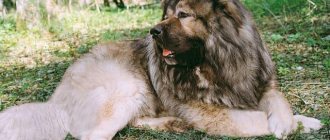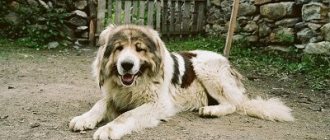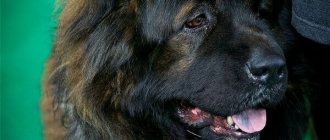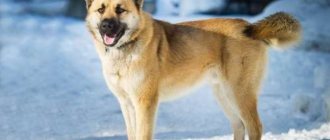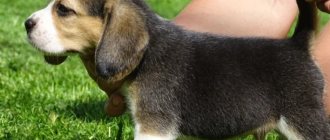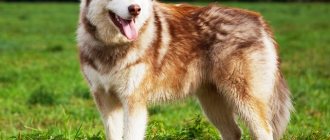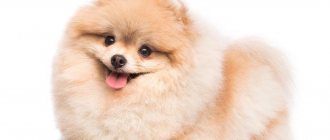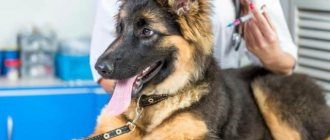Caucasian Shepherds have an ancient history of their origin, and our ancestors sought to breed unpretentious dogs, therefore powerful wolfhounds have an excellent appetite, and they are not picky in their food preferences.
But, like other breeds, Caucasian Shepherd dogs cannot be fed with just anything; they need a complete, balanced diet, without “snacks” harmful to their health. Excessive nutrition will lead to obesity, and such tasty, in the opinion of the owners, foods as lard, smoked meats, bones and fried meat will turn a stately and powerful dog into a sedentary, sickly animal with dull fur.
How to feed a Caucasian Shepherd
The amount of food and number of feedings should correspond to the age of the dog. Puppies aged 8 to 12 weeks need to be fed 4 times a day, from 3 to 6 months - 3 times a day, from 6 months to 1 year - 2 times a day. For dogs older than one year, it is enough to feed them once a day, but some dog breeders divide the daily amount of food into two times.
It is important not to overfeed dogs, especially during puppyhood. Caucasian Shepherds mature slowly, up to 3-5 years. Therefore, a rapid jump in the development of muscles and skeleton leads to health problems, in particular with the musculoskeletal system. It is important that during the period of growth and maturation of puppies, products contain a small percentage of fat and protein.
The amount of food depends on the size and activity level of the dog, and the composition of the food. With natural feeding, 35-45 grams of food per 1 kg of animal weight is enough, for example, a dog weighing 45 kg needs about 1.5 kg of food per day. As for dry food, you need to focus on the values indicated on the packaging in the line of food allowance for large and giant breeds. Sometimes it is necessary to increase the norm by 15-20%. Usually 15 grams per 1 kg of animal weight is enough.
It should be remembered that in the summer, pets, especially on hot days, may lack appetite. This phenomenon is normal, so there is no point in worrying and trying to force feed your dog, especially by offering harmful treats. In winter, the calorie content of food must be increased if the animal lives outside.
Vitamins and mineral supplements
When eating natural foods
A good addition to the daily menu would be:
- bone flour;
- fish fat;
- live yeast;
- powdered eggshells.
A couple of times a year, it is advisable to give your dog complex industrial supplements:
- Farmavit Active;
- 8 in 1 Excel;
- Unitabs;
- WolmarW
It is recommended to do a blood test first to understand exactly what substances your pet is lacking.
Adult dog diet
The basis of the diet, as a natural predator, is meat and offal. Raw horse meat and beef are optimal. The dog should receive at least 600 grams of meat per day. The diet may contain offal, which is less nutritious than meat, but contains more useful elements, in particular unpeeled tripe, which is given raw. The heart, liver, kidneys and lungs must be thoroughly boiled to avoid infection with worms. It is acceptable to sometimes give raw beef bones. Mixed with other products, meat and bone meal should be given in the amount of 100 grams per day.
You can give chicken, but only if the dog is not allergic. But chicken bones, like rabbit bones, should not be present in the diet of a Caucasian Shepherd.
Fish should be regularly included in your pet’s diet as a source of phosphorus. Cheap species of river and sea inhabitants, such as pollock, sprat and hake, if constantly fed to your pet, are harmful to health. Fish can only be served boiled.
You can feed Caucasian Shepherd dogs rice and buckwheat throughout their lives. Porridge is boiled in water for an hour; it is permissible to cook it in meat broth in the winter to increase the calorie content of food.
Cabbage, carrots, pumpkin, zucchini are useful for both people and animals, and greens are added to any type of feed. However, greens do not play a significant role, since they cannot be given in large quantities, and a pinch will not be beneficial. Vegetables should be given raw; when feeding the Caucasian Shepherd, boiled potatoes should be avoided, since they are not digested and, therefore, there is no benefit from them other than satiety. Fruits can be used as a treat or as an addition to the main diet, but it is better not to offer exotic fruits to avoid an allergic reaction.
The Caucasian Shepherd's body digests low-fat fermented baked milk, yogurt, kefir, and cottage cheese well; these products can be given without fear. But you can’t give milk, because the dog’s body loses the ability to digest it over time.
Chicken eggs, boiled or raw, can be given in limited quantities - no more than 5 pieces per week.
Prohibited Products
Food without salt and spices. Human food in the form of soup, cabbage soup, canned food and semi-finished products should be completely excluded. It is prohibited to give in any quantity:
- Pasta;
- Potato;
- Tubular bones;
- Chocolate, sugar and other sweets;
- Butter pastries;
- Sausage, frankfurters, smoked meat;
- Salo;
- Mushrooms;
- Dried fish;
- Refrain from table scraps.
The owner chooses the Caucasian Shepherd and what to feed it. It is best to consult a doctor or breeder in advance. Usually, before the new owner takes the baby into the house, breeders recommend food and talk about all the features of the diet.
Feeding a Caucasian Shepherd puppy
For the first week after purchasing a puppy, it should be fed with the same food that it received from the breeder. Then variety is gradually introduced into the baby’s diet.
The puppy's morning feeding includes cottage cheese, and for lunch he is given meat food - scraped meat or raw meat thinly cut into small pieces, namely beef. It is permissible to divide the daily amount of meat into several parts and give it in small quantities at each feeding. In the evening, it is advisable to give the puppy vegetables with a very small amount of low-fat kefir or a few drops of vegetable oil. Puppies under two months of age need to receive 250 grams of meat per day, after two months - 400 grams, and by the age of one year, a grown-up baby should receive at least 600 grams per day. From 4 months you can give lamb, and from 6 months - boiled offal, such as liver, heart, kidneys.
The diet of a Caucasian Shepherd puppy should include boiled white sea fish, rice or buckwheat, eggs, fruits, and vegetables. New foods should be introduced into the diet gradually, observing the body’s reaction.
With a natural type of nutrition, up to a year, the puppy needs supplements of glucosamine and chondroitin, calcium, vitamin C. When feeding dry food, additional supplements are not needed, because the food is already balanced.
Preliminary information
The exterior of Caucasians begins to form immediately after birth - this process lasts a whole year and ends at approximately 12 months. From 1 to 7 months the most rapid development occurs, so at this stage it is especially important to organize the correct regime and feeding of the Caucasian Shepherd.
A well-designed menu implies the presence of all the necessary nutrients, an optimal balance of carbohydrates, proteins and fats, as well as the quality and variety of food.
In any case, when taking your baby from the breeder, ask what he was fed there - first you will have to adhere to the same scheme and the same diet. You cannot suddenly switch your puppy to a different diet - this can cause severe stress in the body. Only after a month can you begin to gradually change the regime and menu - this will give the baby the opportunity to endure the changes without unnecessary worries and worries.
Feeding the Caucasian Shepherd with dry food
Commercial food is more convenient because the owner does not need to spend time preparing food and preparing a balanced diet. However, it is important to choose the right food based on your dog's size, age and activity level. When choosing food for Caucasian Shepherd puppies, you should avoid those that contain corn, wheat, which are the main ingredients, as well as soy, preservatives, and flavor enhancers. The best option for the Caucasian Shepherd is dry food with a protein percentage ranging from 23-26%, fat from 12% to 16%.
Similar articles:
- Personality of the Caucasian Shepherd
- Diseases of the Caucasian Shepherd Dog
- Disadvantages and advantages of the Caucasian Shepherd
- Pregnancy and childbirth of the Caucasian Shepherd
Possible problems
The reasons why a pet eats poorly can be divided into two groups:
- psychological;
- physiological.
The first group includes the anxious or nervous state of the animal. Perhaps you are away from home too often and your dog is getting bored. Or the calm and measured life of a pet was disrupted by a sudden move or arrival of people unfamiliar to him. A dog may not eat well even during heat.
The second group includes such things as indigestion, scratches in the mouth, for example, from bone fragments, and the presence of parasites (worms). An animal does not eat well when it is sick. For example, the cause may be malfunction of the thyroid gland, complications of cardiac activity, kidney or lung disease, or cancer.
Also, the Caucasian Shepherd may begin to eat poorly if it has experienced severe shock or is in pain. In hot weather, your dog's appetite may also decrease.
If you notice that your dog is not eating well, be sure to take action. First of all, watch her. Perhaps the animal simply ate something from the ground and will have an appetite for its next meal. Try not feeding your pet for 24 hours so that he gets hungry. Access to clean water is a must.
If after a day the Caucasian Shepherd’s appetite has not returned, and she herself looks lethargic, immediately show the dog to the doctor. Most likely she got sick.
The formation of the Caucasian Shepherd dog was influenced by its historical habitat. The animal is tolerant to low temperatures and resistant to diseases.
Timely vaccination will minimize infectious diseases. The created conditions that meet the physiological requirements of the animal will eliminate a number of health-related pathologies.
1. Infection with plague, hepatitis, leptospirosis will be accompanied by: fever, lack of activity, refusal to feed, vomiting and diarrhea.
2. Metabolic disorders due to poor diet, risk of developing agammaglobulinemia with infectious symptoms.
3. Hormonal imbalance leads to diabetes. Signs of the disease will be weight loss, constant thirst, dry mucous membranes. Hormonal imbalance will lead to abnormal location of the testicles, dwarfism, and gigantism.
4. Diseases related to musculoskeletal function: dysplasia, sagging of the hind or front legs, lameness.
5. Pathologies of a neurological nature: neuroses, muscle spasms, epilepsy.
At the first signs of illness, you need to contact the nearest veterinary clinic for help. One of the most common diseases is obesity. If there are no disturbances in the endocrine system, then the reason is improper feeding. It is necessary to reduce the amount of food and increase the frequency of walks.
Important Tips
You should not give your Caucasian Shepherd anything salty, sweet, smoked, fatty, or pickled. Also exclude spices, potatoes, citrus fruits, legumes, sausages, salami, and lard from your dog’s diet. Pieces of low-fat cheese, carrots, apples or, in the case of ready-made food, dry food are suitable as rewards.
Do not overfeed your pet - give him enough food according to his age. When feeding a dog with ready-made food, ten to fifteen grams per kilogram of its weight will be enough. When feeding with natural products - thirty-five to forty-five grams of food per kilogram of Caucasian Shepherd dog weight.
In the cold season, an adult dog needs to be fed twice a day, while in hot weather one feeding will be sufficient. Always make sure your pet has clean water, especially in hot weather.
In the case of natural nutrition, you need to pay attention to the quality of the products. If you notice that food has begun to spoil, throw it away.
Do not forget about the correct implementation of the regime. The Caucasian Shepherd Dog should get used to the fact that you feed it at the same time in the same place. Remove food after fifteen to twenty minutes, regardless of whether the pet has finished eating or not. Strictness in performing these actions will minimize problems with disobedience and begging in the animal.
In general, you should not spoil your dog. Although Caucasian Shepherds are unpretentious eaters, they can get used to a variety of tasty treats, especially from your table.
For dog food and water, it is best to purchase two stainless steel bowls along with a special stand. As the puppy develops, you can adjust the length of the stand so that the pet does not have curvature of the cervical and dorsal vertebrae.
What do you feed your dog?
![Weight of a Caucasian Shepherd puppy by month [table]? How to feed](https://loshadka24.ru/wp-content/uploads/ves-shchenka-kavkazskoj-ovcharki-po-mesyacam-tablica-kak-kormit-330x140.jpg)
